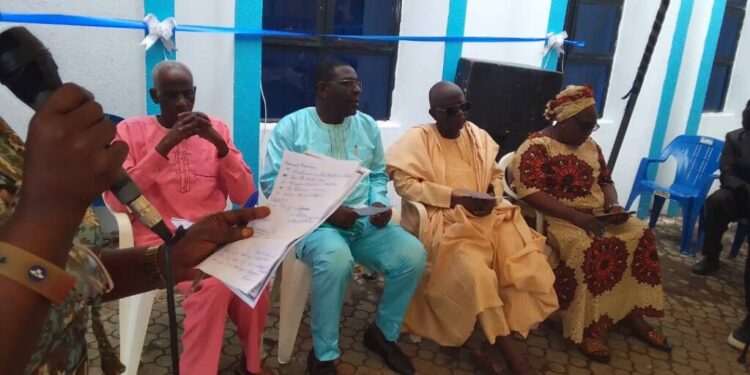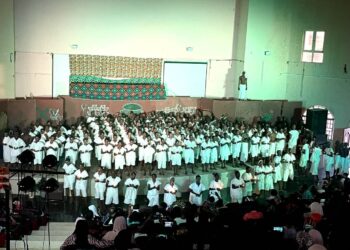By Fémí Emmanuel
After two years of distress and eventual liquidation, Ologbon Microfinance Bank has returned to life under a new name and leadership. Now known as Akata Microfinance Bank Ltd, the institution has been revived with a fresh vision, upgraded facilities, and a new board of directors.

Originally closed in 2023 following the withdrawal of its operating license by the Nigeria Deposit Insurance Corporation (NDIC)—alongside 177 other microfinance banks nationwide—the bank’s resurgence has been described as a testament to resilience and community commitment.
Speaking at the official reopening ceremony, the new Chairman of the Board, Pa A.A. Ajekigbe, a respected community leader, declared, “Akata is witnessing a new beginning with the arrival of Akata Microfinance Bank Ltd.”
He revealed that the rebirth of the bank followed the collective efforts of a group who applied to repurchase the defunct Ologbon Microfinance Bank from the Central Bank of Nigeria. The CBN approved the application and issued a new operating license in January 2025, paving the way for its relaunch.
Now fully renovated and restructured, Akata MFB boasts modern facilities and digital banking systems designed to provide efficient services.
The new board includes: Senator Oriolowo Adelere, Rev’d Dr Olubode Oke, Mr. Olaniran Sunday, Very Rev’d Dorcas Akinyode
Pa Ajekigbe assured the public that the bank would operate under robust corporate governance and leverage cutting-edge technology to serve customers better.
“This is a bank that can now compete favourably with other MFBs across Nigeria,” he said, emphasizing that both returning and new customers could trust the safety of their deposits.
He further added that all legacy deposits from the defunct Ologbon MFB were secure.
“Know that your investment is safe. To our existing customers, your money is intact. Please continue with us and trust us—you will not regret doing so.”
The new bank will operate under the motto: “We solve, you evolve.” It is launching with integrated banking software at Level 2—a significant upgrade from its predecessor’s Level 1.
This upgrade includes:
USSD banking
Airtime top-ups
Inward and outward transfers
Internet and mobile app-based banking
Access to ATMs and digital self-service tools
Dr. Olubode Oke, a board member, affirmed that the bank had invested heavily in technological infrastructure.
“Ologbon was on Level 1. Now, we’ve moved to Level 2. With our mobile app and internet banking, customers can now access services from the comfort of their homes,” he told journalists.
The well-attended relaunch attracted dignitaries from both the commercial and microfinance banking sectors, including representatives from First Bank, Zenith Bank, Polaris Bank, Caretaker MFB, Randalpha MFB, Doje (formerly Olowolagba MFB), and Ajewole MFB.
All pledged continued partnership and support to ensure the bank’s stability, echoing the popular admonition: “Affliction shall not rise the second time.”
In a brief exhortation, Rev’d Dr P.O. Olaleye of Ayegun Baptist Church urged the management to operate with faith in God and prioritize customers’ interests while upholding professionalism and integrity.
“Follow procedures and guidelines. Honour and treat your customers well. Put the interest of the bank above even that of the board,” he advised, praying the new bank’s glory would surpass the former.
Senator Adelere, a former Senator who represented Osun West (2019–2023), expressed joy at the bank’s revival.
“This is a rare grace. The collapse was due to governance flaws, not fraud. Going forward, integrity, knowledge, and wisdom will be our guiding principles,” he stated.
Some legacy customers also expressed delight at the bank’s return.
Prince Ayo Taiwo, popularly known as Ayo Akala and a produce buyer, said:
“We thank God for the rejuvenation of this bank. I urge the staff to be ready to render quality service and support customers with timely loans.”
The event drew an impressive list of community figures and stakeholders, including: Chief Yemi Alao – Chartered Accountant and Auditor
Dr. Sunday Oyelami – Ogo-Oluwa Hospital
Hon. Adedeji Adeyemo – Former Chairman, Ogbomoso South LGA
Mrs. Kike Adegbola – CEO, Kike Fabrics
Rev’d Dr. Femi Ojo – Union Baptist Church
Rev’d S.A. Adeoye – Former Chaplain, Oyo State Government House
They all commended the board for their courage and commitment in bringing the bank back to life and called for continuous compliance with regulatory guidelines.
You can get every of our news as soon as they drop on WhatsApp ...To get all news updates, Join our WhatsApp Group (Click Here)







